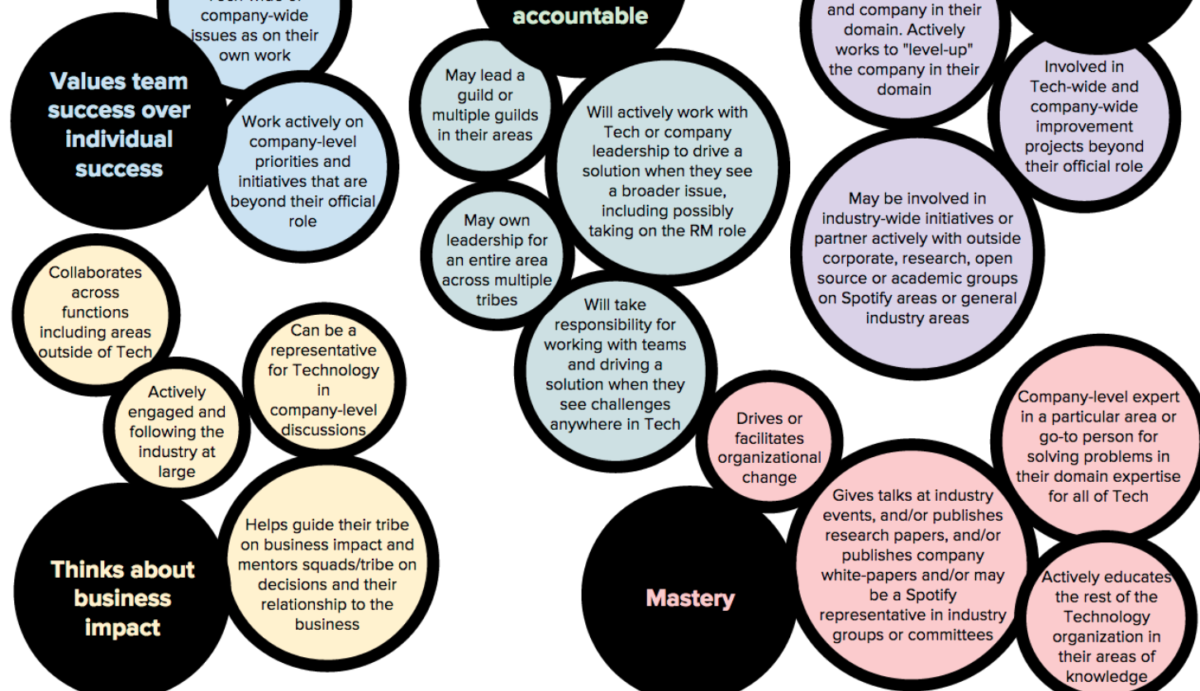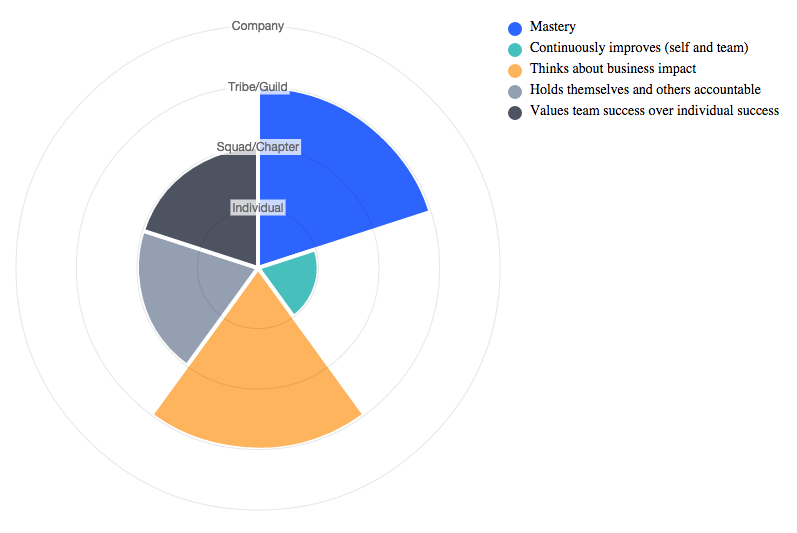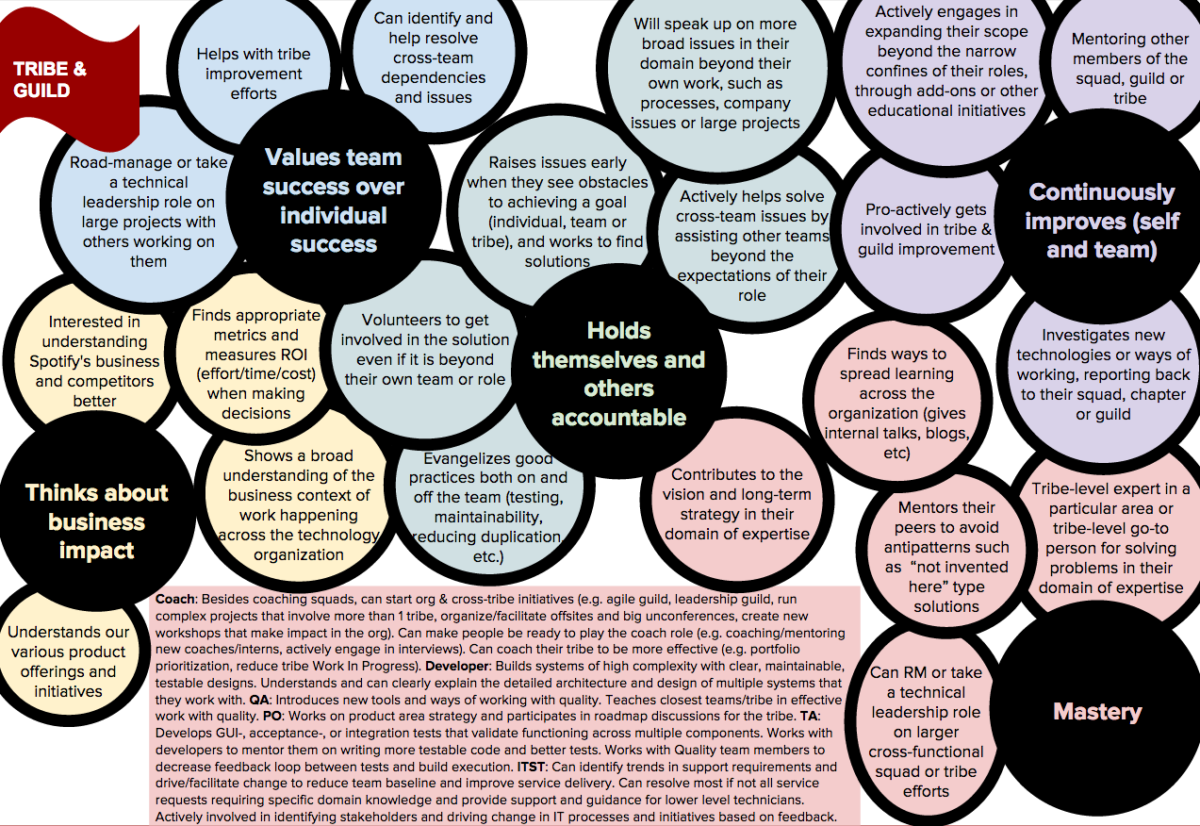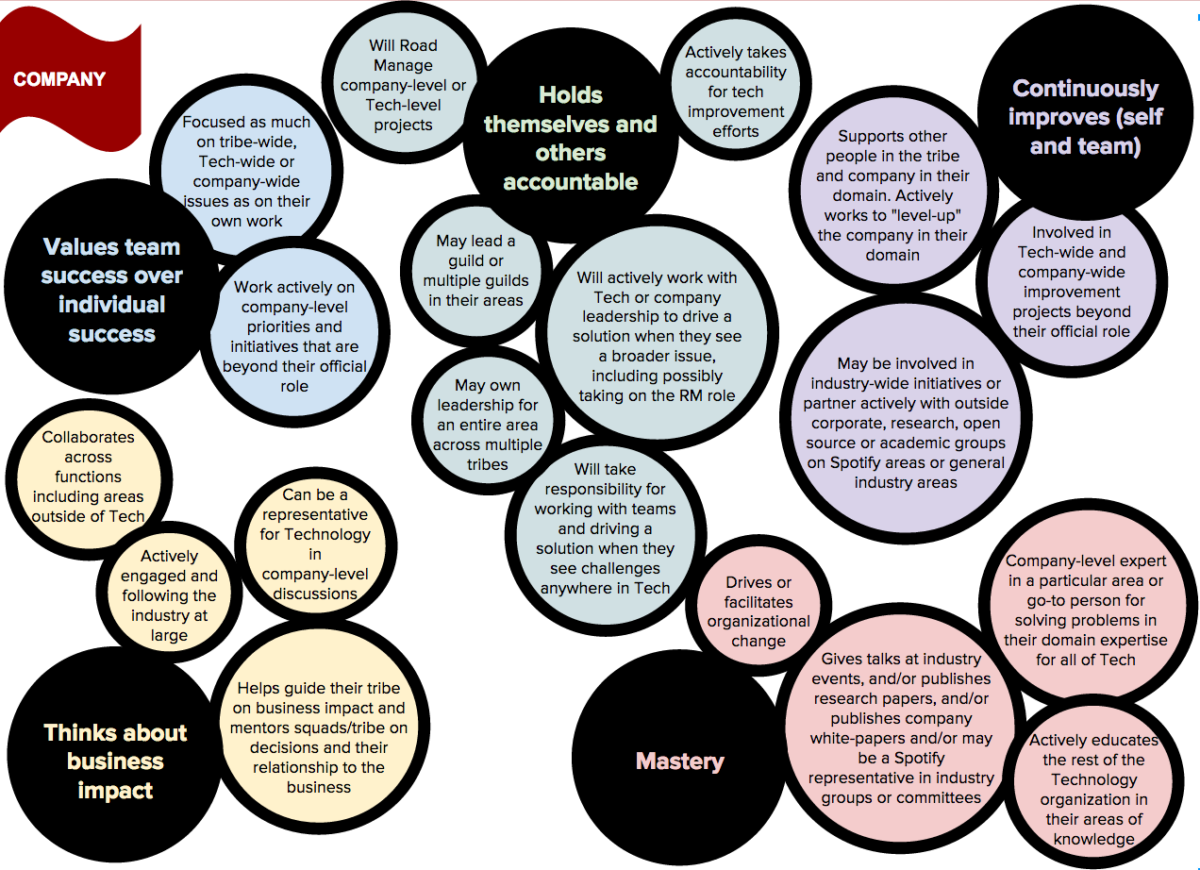This is a repost from: https://labs.spotify.com/2016/02/15/spotify-technology-career-steps/
This is part two of a three part series on how we created a technical career path for individuals at Spotify and what we learned in the process. This post contains the actual version one of our Technical Career Steps. This is the complete document, so it is a bit long. In the next and final post, I will talk about the mistakes we made along the way and the good and bad lessons we learned. If you haven’t read the first segment, you should start with that.
Table of Contents
Motivation behind the Steps Framework
As Technology within Spotify has grown over the years we have learned that people striving to increase their impact often wanted to become a Chapter Lead or Product Owner even if they might have preferred the role of an individual contributor engineer. Everyone in Spotify Tech should have a way to grow their careers and expand the impact of their -work no matter what role they play. A shift into a Chapter Lead or PO position is not necessary.
The Steps Framework provides a way to do this.
The Steps Framework
As your career evolves within Spotify, you will likely take on a variety of roles, in a variety of contexts. You will work with multiple teams, on multiple projects, perhaps in very different domains or perhaps in a smaller area of specialty. You will build capabilities and mastery. Your impact on Spotify will grow, and so likely will your sphere of influence.
Your career development within Technology will therefore be a journey — sometimes sideways, sometimes forwards, and always flexible. There are some common patterns in the series of roles people decide to take on, and in which disciplines and expertise areas they focus, but this is not rigidly defined. It is up to you, with the help of your manager, to choose a path that aligns your interests and the company’s, and that helps you develop, grow, and meet your own unique personal goals.

Throughout this journey, as you gain experience and develop your skills, you will have greater and greater impact. In other words, the degree to which you contribute to the success of Spotify — its team and its mission — will grow over time.
The Steps Framework is designed to provide you with:
- The opportunity to explore new roles, skills, contexts and disciplines over time, avoiding a specific, rigidly-defined “track”
- A way to understand your progression toward greater and greater impact, independent of specific role or discipline
- A set of well-defined expectations corresponding to defined points in this progression
In practice: Disciplines, Roles & Steps
In practical terms, supporting this development journey requires a more complex framework than a typical vertically-oriented hierarchy or “career ladder”. There are three key elements in the Steps Framework:
- A Discipline is a domain of expertise and impact. Examples include:
- coaching
- software development
- testing
- project management
- A Role is a way in which you engage with a team, a project, or a discipline. They are not all formally defined, but there are some common ones. Examples include:
- software engineer
- tester
- road manager
- technical product owner
- chapter lead
- agile coach
- A Step is the combination of a well-defined set of expectations and behaviors associated with a particular degree of impact on Spotify. As you take Steps on your career path, your impact grows.
In the end, your path will involve taking Steps forward, growing your impact and broadening your influence while you evolve through specific Roles in various Disciplines. Your compensation is influenced by your Step, aligning your performance to the positive impact you are able to have on your team, your product, and Spotify as a whole.
Moving to a new Step in a given domain represents both an acknowledgement of what you have done and a commitment from your manager that you will get bigger challenges in the future.
Your Step is a measure of your personal growth and is intended for use in discussions about career development between you and your manager. Your Step is private: only you and your manager can see your Step. But we believe in transparency, and so will re-evaluate whether everyone’s Step should be public in some form after we have lived with the framework for a while. It is much easier to share this information later than to un-share it if it becomes problematic.
Behaviors and our expectations at different Steps
We have identified five sets of behaviors that provide a framework for understanding and talking about the expectations on all of us, at different levels of impact. They are:
- Values team success over individual success
- Continuously improves themselves and team
- Holds themselves and others accountable
- Thinks about the business impact of their work
- Demonstrates mastery of their discipline
The greater the impact, the more we expect in each of these areas. A “senior” technologist who’s helping to set company-wide strategy will need to make these values manifest in different (and more sophisticated) ways than a fresh-out-of-school member of a squad.
The path
There is no one path through this framework. It is up to you and your manager to navigate the set of roles and the contexts in which those roles can be played, finding good ways to align your interests and your organization’s needs. Through this process, you will always learn and grow, increasing your impact on the company, and thus moving to different Steps. There is no expected amount of time that you will spend on each Step. Some people will move through them faster, and some will go slower. Some will reach a Step and choose not push towards the next Step, instead growing in other ways. The steps themselves are a measure of professional maturity and are therefore cumulative. A Tribe/Guild-step contributor shows all the behaviors of the Individual-, Squad/Chapter- and Tribe/Guild-steps.
Career Steps for Tech employees
There are five characteristics that every individual in Tech should develop as part of their professional growth at Spotify:
- Values team success over individual success: We are a team and not a collection of unaffiliated individuals. You may be part of several teams: your squad, your chapter, your guild(s), your tribe. Contributing to the success of each of these groups is more beneficial to the company, the product, and our customers than chasing your own success at the cost of your teams.
- Continuously improves (self and team): Spotify believes in never settling for the status quo. We are always focused on learning and growing.
- Holds themselves and others accountable: As a company we value transparency and autonomy. These values must be coupled with accountability if we are to succeed. Taking responsibility for your own actions and the actions of the team and holding others to this standard is critical for us to be able to trust and work with each other.
- Thinks about business impact: Spotify is a business. If we wish to keep working within this culture that we’ve built, we need to make sure that we are aligned with that business. Understanding how the choices you make affect the company is important for your growth as a professional.
- Mastery: While the other characteristics talk about expectations and behaviors that are independent of your domain or role, mastery is specifically about becoming a better software engineer, agile coach, technical product owner, QE, QA or TA. There are items marked for each of these disciplines. Anything that isn’t marked is expected of all roles.
We have also identified four Steps in your career path at Spotify. Each Step is marked not only by increased responsibility, but also by your increased impact within tech.
- Individual Step. At this step, you are focused primarily on being a useful contributor, gaining experience and learning how to be effective on their team. It is not expected that a member of technology would remain at this step during their entire time at Spotify. At this step, your focus should be on growing so that you can support your team. This is the only step where there is an expectation that all members of technology should move toward the next step.
- Squad/Chapter Step. At this step, you are a resource for your chapter or your squad, either as a domain specialist for your team, or as a generalist/problem solver for them. You should be able to lead smaller efforts coordinating with other members of your team and drive them to completion and/or dig into tough problems and solve them independently taking in feedback from your peers and focusing on the outcome.
- Tribe/Guild Step. At this step, you have an impact across squads or chapters. You are a resource for a larger group as a domain expert or generalist. You will lead cross-team (squad/tribe/chapter) efforts involving more people and drive them to completion and/or you will take on large challenges, working with diverse stakeholders in multiple teams to solve a problem that affects your larger organization.
- Technology/Company Step. At this step, your focus is significantly on supporting Tech-wide or company-wide initiatives. You will Road Manage projects that span tribes and be responsible for solving Tech-wide problems, and/or you will also represent Tech in company and/or industry forums, and/or you will be a go-to person across the company to solve very complex problems

On recognition and promotions
When you are consistently demonstrating the behaviors and sustained impact of someone at a wider Step, your manager should recommend you for an official promotion (as long as you are willing to accept the increased expectations going forward).
The process for promotion depends on the Step involved:
- A chapter lead can promote one of their individual step employees to squad/chapter step without outside approval, though the chapter lead will make this decision in part based on feedback from that employee’s peers in the squad and chapter.
- Promotions from squad/chapter step to tribe/guild step must be approved by the relevant tribe lead, after consultation with tribe-level leadership.
- Promotions to technology/company step must be approved by the CTO, after consultation with technical leadership, including people currently at the technology/company step.
Since we place so much value at Spotify on being an effective member of a team; promotion to the next step, at all levels, should involve consultation with a varied group of the person’s peers. This can be done using the loops tool in addition to direct conversation, for example.
Formal promotion to a new Step will normally come with an immediate compensation increase, as well as an immediately increased scope of responsibilities. The promotion represents a commitment from both sides: you will keep executing at the more advanced level, and your manager will continue to provide opportunities to have broader impact.
Examples of broader responsibilities as part of being at a more senior step for a developer could include things like:
- driving the technical implementation of a new feature for a squad at the squad/chapter step
- figuring out how a tribe should adapt their systems for anonymization at the tribe/guild step
- leading the CDN technology strategy for content delivery, including technical feasibility, cost/benefit analysis, and vendor selection at the technology/company step
Public recognition will frequently be decoupled from formal promotion. We believe it’s more effective to recognize people for successful completion of important projects than for reaching a (somewhat rare) career milestone. So we expect to see more announcements like “Please join me in congratulating Jane Jones, who drove this project to completion over the last few months” and fewer announcements like “Please join me in congratulating Jane Jones, who has officially been promoted to the Tribe/Guild Step”.
On Setting the Step for a New Employee
It can be hard to tell what step a new employee is on based solely on their interviews. To give the employee time to acclimate to Spotify and their role, their official step will not be determined until their six-month review. During that review, the step is set through a discussion between the new employee and their manager.
The new employee should do a self-evaluation with the framework to see how much they believe each behavior represents them. The manager should talk to the peers of the employee and use their own knowledge and experience from working with the employee to do an initial evaluation of how the different behaviors in the framework describe the employee. A discussion between the manager and the employee will show where they agree and where they differ, and allow them to reach a decision on which behaviors describe the employee today. This also sets the context of areas to focus on in the near future for growth.
On Compensation
Your compensation as a Spotify Employee within Technology is influenced by the Steps Framework: having a bigger impact on the company should lead to higher pay in a straightforward and transparent way.
We want to make sure Spotify salaries are following the market. Therefore we get salary benchmarks from specialised suppliers and industry leaders in this area. Since the salary benchmarks are used as a recommendation and not as strict guidelines when setting salaries we will not share them internally. We’ve always used market data to help guide our pay principles. Since H2 of 2015 we are matching them to work within our steps framework.
The salary benchmarks for Steps overlap each other. This means that a person at the Individual Step can earn as much as someone at the Squad/Chapter Step and vice versa.
On Titles
Steps do not map to titles. We approach titles differently depending on whether we’re talking about internal or external use.
Internally:
- Scopes of impact have defined names — the Individual Step -> Technology/Company Step.
- Roles have defined names — some more formally defined than others.
- Roles are typically more useful for internal communications than anything else.
Externally:
- Employees have a tremendous amount of flexibility regarding how they represent themselves externally.
- They can use their roles, they can use more standard titles that they feel are more communicable.
- We may in the future provide examples of external titles that commonly map to our internal role names to facilitate this.
- We expect employees and their managers to work together to come up with appropriate external title usage.
Expectations for each Step




On Requirements vs. Examples
A few questions are common around the examples provided in the framework: are the behaviors in the bubble diagrams hard requirements? How many of behaviors must someone be demonstrating, and how consistently, and for how long *must they be demonstrating them before they are considered to be at a particular step?
The most important point is that managerial judgment is always required: this framework provides a structure for fostering conversation between managers and employees, but it cannot ever provide a detailed recipe for how to handle any particular situation. So the answers are intentionally not black-and-white.
The intention of the Steps Framework is to describe what it looks like for an individual to have increasing levels of impact on the Spotify tech organization. But the truth is that there are lots of ways to have big impact, and we want to support all of them. Someone might be moving the whole company forward through their deep expertise in a particular technology, and by putting on their headphones in a corner and singlehandedly writing a huge and critical piece of infrastructure that accelerates the work of hundreds of other people. Someone else might move the the whole company forward by spending lots of time in meetings, driving consensus and resolving conflict as the company does something new. These, and lots of variants in between, are all valuable.
So the answer is that the behaviors in the bubbles are mostly examples: many of the bubbles describe a specific activity more than a general behavior. These “activities” are mostly meant as examples of step-appropriate behaviors, as opposed to specific activities required to demonstrate that behavior. In aggregate, they paint a picture of what we mean when we say “tribe and guild impact”, “squad and chapter impact”, etc. But they should be treated as triggers for discussion rather than a checklist. Are you doing this thing? Would your work have more impact if you did? In general, we think these are all valuable things that people in tech should do. But it’s not about seeing a behavior once and checking it off, or seeing a behavior consistently and checking it off, or about checking off 80% of the bubbles at some level or 100% of the bubbles. It’s about the impact that your work has over time, and these bubbles are a loose proxy.
FAQ
What about my special situation?
These guidelines should never trump common sense. People are complicated, and there may be some special cases that this framework does not address well. Managerial judgement will always be needed, in all cases.
I do not see myself as a developer, QA, TPO or a coach. My discipline is not mentioned in the framework, what expectations are set on me?
The framework provides examples for four of the most common disciplines within tech, but there are others. It would not be possible to define good examples for all possible disciplines or combinations of these. The existing examples should inspire and help you and your manager to set the expectations for you even if the names of the disciplines are not a perfect match. If a tribe after evaluating the framework later comes to the conclusion that the present disciplines are not helpful enough and need arises to define new examples for other disciplines they can introduce new ones.
Is there a set of formally-defined roles?
No. As context and ways of working differ across Technology, formal, pre-defined roles would not fit into a lot of squads. We do have disciplines (e.g. coaching, software development, toolsmithing, quality assisting, …) to guide skill sets and expectations, but as an individual contributor at Tech we do not forcefully limit our work to one of these.
What is the connection between Roles and Steps? Do I have to be at a specific Step to take on certain Roles?
Not for most roles – but some. Examples: You won’t be a good chapter lead if your sphere of influence is Individual, hence being squad/chapter step or above is needed. To be a Chief Architect your sphere of influence needs to be on a company level.
Is this a reporting hierarchy?
Reporting is based on your Role and Discipline, and not your Step. Based on their role, a Software engineer of any step can still report to a Chapter Lead.
Are Steps like “Senior”/etc. designations?
Steps are a tool to facilitate career development and do not confer any title.
Do I have to demonstrate the behaviors in all value areas to be considered for a wider Step?
As a rule, yes. Steps are intended to reflect growing spheres of influence and impact. We believe all the competencies listed are necessary for someone to really have the increased level of impact that a new Step represents. However, people are complicated, and there may be cases where someone’s strength in one area compensates for a weakness in another.
Do I need to continuously move through steps during my career at Spotify?
This is something to discuss with your manager. While we expect engineers to continuously improve their skills there is no rule that one must also continuously increase their sphere of influence. Individual step is considered an introductory step for an inexperienced contributor. We do expect that employees will move from the individual step as they become contributing members of their squad.
What happens if I want to move to a step with less impact?
You may choose to embrace a new discipline where you have a significantly lower level of mastery. There may be other situations that lead you toward this choice. Again people are complicated and we neither can or should try to anticipate every situation. If you decide that you want to make this kind of change, discuss it with your manager. Note that your compensation is tied with your Step.
How does this relate to loops?
Loops is a tool focused on performance development that puts employees in the driving seat. It can be very useful for your career evolution. Promotions are a separate process from Loops.
How does this relate to Priorities and Achievements?
Priorities and Achievements are a way for you to make commitments to goals and measure your performance against them. This can help determine your salary adjustments within your range year to year, but it is not tied to your step which will determine your salary range itself. As you increase your impact by moving to wider steps, your priorities and achievements should reflect that.
When can I get promoted?
When you and your manager agree that you are consistently operating at the next Step. Specifically, promotions do not need to be tied to the annual salary review cycle. See “On Recognitions and Promotions” for the details on how the promotion process works.
To what extent is this a tool, guidance, or a formal policy?
This framework is intended to provide a concrete toolset for employees and their managers. It is the model all of Technology is using. While deviations may make sense and be needed in some cases, that is the exception and is something that should be discussed at the tribe leadership level.
How does my Career Step affect my salary?
Your career step is used to determine a range of pay based on people at a similar sphere of impact in similar disciplines. This pay range gives guidance to managers on competitive rates of pay in the industry. It does not set your salary from year to year. Your pay change set in your yearly salary review is based on your performance based on expectations during the previous year.
Do I need to be promoted to increase my salary?
No. You can stay at a step and continue to increase your salary year over year. The salary ranges from step to step overlap significantly and they track the market (which is evaluated every year). Your salary increase is based on your performance, your behaviors, and the market.
How do I as an introvert fulfill the expectations on communication and networking in this framework? It seems to be tailored for more extroverted people.
The important thing is to make a positive impact. Given that, you have to find your own way, something that you feel comfortable with. Some people prefer the written language, others the vocal one. Some people share their ideas right away, others prefer to take time to think and elaborate. You just need to make sure you are communicating in an effective and constructive manner.
